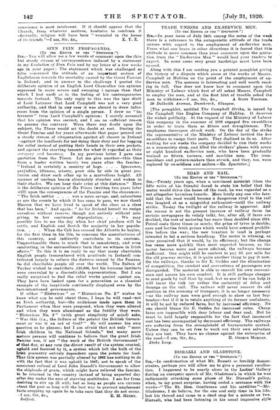ROAD AND RAIL.
[To THE EDITOR OF THE " SPECTATOR."1
SIR,—Twenty years ago, when a convinced motorist (then the Me noire of his- friends) dared•. to state his belief that the motor would drive the horse• off the road, he was regarded as a not altogether harmless lunatic. More lately any one who fore- told that the road would_ become a dangerous rival to the rail was laughed at as a misguided enthusiast—until the railway strike. To-day the twilight of the railway is apparent. And the reason is not the present increase of railway fares (as certain newspapers do vainly talk), for, after all, if' fares are doubled, the cost of motoring has more than doubled since 1914. Petrol costs three times as much; the price of tyres is double; cars and lorries fetch prices which would have seemed prohibi- tive before the war; the new taxation is (and is perhaps intended to be) a serious handicap. The motor is winning, as some perceived that it would, by its efficiency; but the change has came more quickly than most expected because, as the motor became more and more efficient, the railways became inefficient. One might still be content to pay 2d. per mile for the old pre-war service, it is quite another thing to pay it now. On the railways, thanks to Sir E. Geddes and the elimination of competition, the comfort and convenience of passengers are disregarded. The motorist is- able to consult his own conveni- ence and assure his own comfort. It is still perhaps cheaper to send goods by rail than by road, but no one if he can help it will incur the risk (or rather the certainty) of delay and damage on the rail. The railway will never recover its old position in the economy of transport, it is no longer necessary —as the railway men were good enough to show us last Sep- tember—but if it is to retain anything of its former usefulness, it will be not by reduced fares, but by increased efficiency. No one should blame Sir E. Geddes for increased rates. Cheap fares are- impossible with dear labour and dear coal. But he must be held largely responsible for the fact that increased cost has been accompanied by decreased efficiency. The railways are suffering from the stranglehold of bureaucratic control. Unless they. can be set free to work out their own salvation they are lost. They have no chance against the enterprise of
Stoke Lacy.


































 Previous page
Previous page